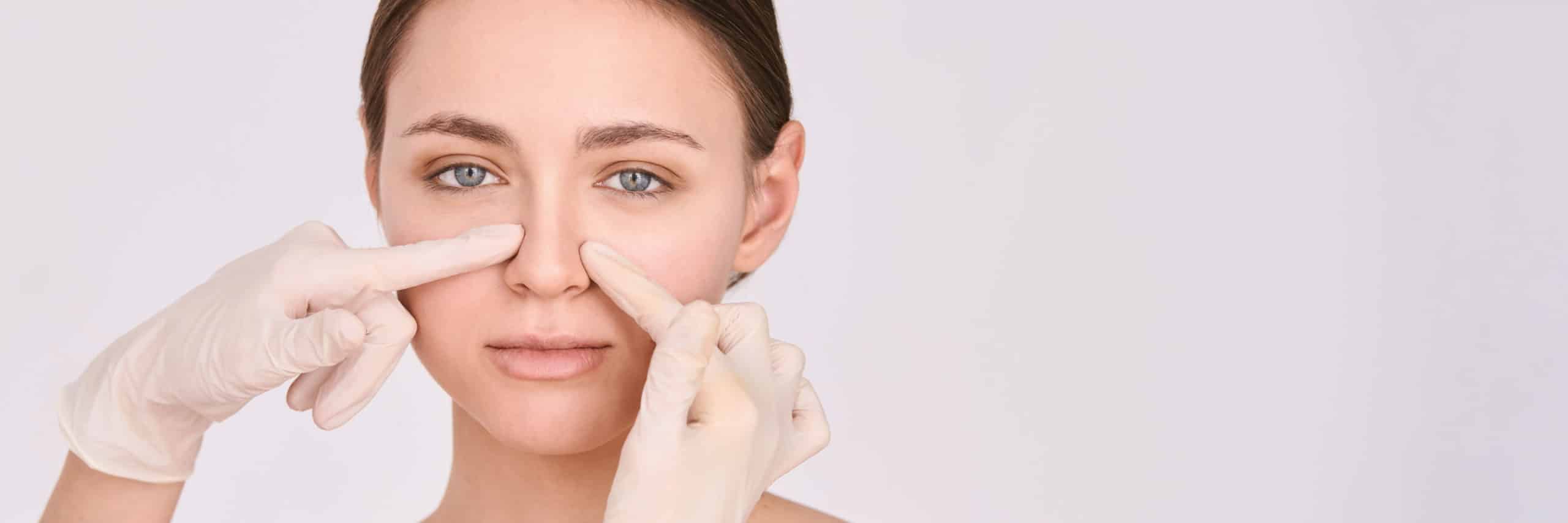Why Would You Need Revision Rhinoplasty?

Although a nose surgery is often a successful and satisfying procedure, no matter if you’re undergoing it for cosmetic or medical reasons, not everyone is happy with the results. Nationwide, at least 5% of rhinoplasty procedures leave people feeling dissatisfied once they’ve fully healed. Because of this, revision rhinoplasty is a big part of what we do here at FacesFirst. It’s worth mentioning, however, that we have a much higher success rate with our rhinoplasty patients.
What is Revision Rhinoplasty?
The term “revision” means any rhinoplasty or nasal surgery performed after a previous procedure has already been performed. Revision rhinoplasty is also called secondary rhinoplasty for this reason.
The goal of revision rhinoplasty is to create a better outcome, which is different for every rhinoplasty patient. It can happen shortly after the first surgery or many years later, but both situations require the same care and attention to detail due to the tissues having been affected previously by another surgery and potentially a different surgeon.
Why Patients Choose Revision Rhinoplasty
The main reason people choose revision rhinoplasty is simply because they aren’t happy with the results. This can be because the initial satisfaction of the new shape, proportion, and angle of the nose has worn off as someone gets used to it and decides they don’t like it, or because the increased breathing ability desired from a medical rhinoplasty hasn’t been achieved.
Because of the many different experiences, surgical techniques, and expectations, revision rhinoplasty is a highly specialized type of surgery. The skin and tissues have already been resected, sutured, and healed, meaning there is scar tissue, weakened structures, and already re-shaped areas of the nose. All this leads to an increased risk for doctors performing revision rhinoplasty to create a satisfying result. That’s why you should always make sure your rhinoplasty surgeon is both board certified and specifically performs revision rhinoplasty frequently.
The causes for poor outcomes of primary rhinoplasty can be broken out into three categories: Technical reasons, healing issues, and failing to meet patients’ expectations.
Technical Reasons
Although most rhinoplasty surgeries go well, regardless of the desired outcome, there is always a risk that errors will occur during the surgery. The specific techniques used and awareness of the surgeon can have unintended consequences if not considered in a holistic, well-understood way that comes mainly with experience performing many rhinoplasties.
Healing Issues
It’s important to understand that the healing process after nose surgery is dynamic. This means your results may look good at first but then several months to a year later, your appearance has drifted due to a lack of underlying structural reinforcement. This is why Dr. Cote performs what’s called structural rhinoplasty, where the supporting tissues are left as intact as possible to ensure long-lasting results.
Not Meeting Expectations Medically or Cosmetically
Ultimately, an elective surgery like rhinoplasty is a partnership between a patient and their surgeon. At FacesFirst, we strive to truly understand each person’s goals and educate them on what to possibly expect from various surgical procedures. Plastic surgery isn’t magic and not everyone will be happy with their results, stemming from a mismatched partnership or a misunderstanding of the expectations.
What is Done During Revision Rhinoplasty
It may seem straightforward, but revision rhinoplasty isn’t exactly the same procedure as primary rhinoplasty. During revision rhinoplasty, it’s often necessary to strengthen the nasal tissues with cartilage, ideally from the patient themselves taking grafts from the ear or rib, or otherwise using artificial grafts. Traditional rhinoplasty techniques will also be used to address cosmetic or functional issues.
Revision rhinoplasty procedures often require longer recovery, since they involve altering previously altered tissue. It’s also even harder to guarantee results because the tissue behaves differently after a prior surgery than it does when it hasn’t been touched before.
Revision Rhinoplasty Specialist in Denver, CO
When it comes to fixing the mistakes or missed expectations of prior rhinoplasty surgery, you should trust a surgeon like Dr. Christopher Cote who has performed many revision rhinoplasties and has the training and awareness to provide long-lasting results. Learn more about your expectations for a second nasal surgery by calling our office or contacting us online today.



 Call Us
Call Us